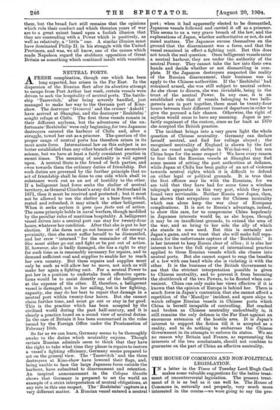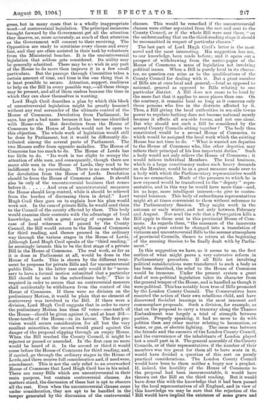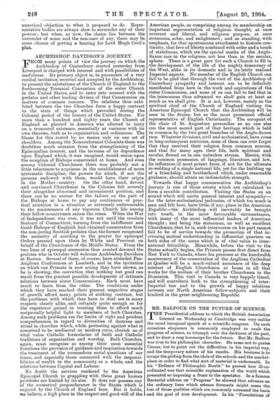TN a letter in the Times of Tuesday Lord Hugh
Cecil makes some valuable suggestions for the better treat- ment of uncontroversial legislation. The present treat- ment of it is as bad as it can well be. The House of Commons is, naturally and properly, very much more interested in the course—we were going to say the pro. grass, but in many cases that is a wholly inappropriate -word—of controversial legislation. The principal measures brought forward by the Government get all the attention they deserve, or, more accurately, as much of that attention -as the Government will consent to their receiving. The Opposition are ready to scrutinise every clause and every line, and they are often assisted in their task by volunteers from the Ministerial benches. It is the uncontroversial legislation that seldom gets considered. Its utility may be generally admitted. There may be n1 wish in any part of the House to do more than improve it in a few small particulars. But the passage through Committee takes a certain amount of time, and time is the one thing that it is least possible to secure. Attention, support, readiness to help on the Bill in every possible way,—all these things , may be present, and all of them useless because the time in which they can show themselves is wanting.
Lord. Hugh Cecil describes a plan by which this block of uncontroversial legislation might be greatly lessened. -without any real surrender of the ultimate control of the House of Commons. Devolution from Parliament, he says, has got a bad name because it has become identified. with Home-rule. But devolution from the House of Commons to the House of Lords would not be open to this objection. The whole work of legislation would. still be done by Parliament, but it would be differently dis- tributed among the several parts of Parliament. The two Houses suffer from opposite maladies. The House of Commons has too mach to do. The House of Lords has too little to do. "Its work is too slight to occupy the attention of able men, and. consequently, though there are many able men in the House of Lords, they tend to be indifferent to its proceedings. There is no case whatever -for devolution from the House of Lords. Devolution should be from the House of Commons alone. It should also be only of the uncontroversial business that comes before it And even of uncontroversial measures the House should keep control, while it should be relieved from the burden of discussing them in detail." Lord Hugh Cecil then goes on to explain how his plan would work out. In the case of private Bills, he would send them to the Council of the county affected by them. This body would. examine their contents with the advantage of local knowledge, and with a great saving of expense in the case of local witnesses. If passed by the County Council, the Bill would return to the House of Commons for third. reading, and. thence proceed in the ordinary way through the various stages in the House of Lords. Although Lord Hugh Cecil speaks of the "third reading," he seemingly intends this to be the first stage of a private Bill in the House of Commons. The real work, so far as it is done in Parliament at all, would be done in the House of Lords. This is shown by the different treat- ment he proposes for private Bills and for uncontroversial public Bills. In the latter case only would it be "neces- sary to have a formal motion submitted that a particular Bill should be sent to the subordinate body.' This is required in order to secure that no controversial measure shall accidentally be withdrawn from the control of the House of Commons. If there were no division on the preliminary Motion, it would be plain that no element of controversy was involved in the Bill. If there were a division, Lord Hugh Cecil suggests that in order to carry the preliminary Motion less than 67 votes—one-tenth of the House—should be given against it, and. at least 201- three-tenths of the House—in its favour. The first pro- vision would secure consideration for all but the very smallest minorities, the second would guard against the danger of the proposal slipping through an empty House. When the Bill reached the County Council, it might be rejected or passed or amended. In the first case no more would be heard of it. In the second or third it would come before the House of Commons for third readi g. and, if carried, go through the ordinary stages in the House of Lords,and there receive full consideration and, if needwere, amendment. This is not the only relief to an overworked House of Commons that Lord Hugh Cecil has in his mind.
There are many Bills which are uncontroversial in their main 'purpose, but contain controversial clauses. As matters stand, the discussion of these last is apt to obscure all the rest. Even when the uncontroversial clauses come under consideration, they are apt to be handled in the temper generated by the discussion of the controversial clauses. This would be remedied if the uncontroversial clauses were either separated from the rest and sent to the County Council, or if the whole Bill were sent there, "on the understanding that on the third-reading stage it should be recommitted in respect of particular clauses."
The last part of Lord Hugh Cecil's letter is the most novel and the most interesting. His suggestion has not, to our knowledge, been madebefore ; and it opens out a prospect of withdrawing from the notice-paper of the House of Commons a mass of legislation not involving political issues. When a Bill is purely local in its charac- ter, no question can arise as to the qualifications of the County Council for dealing with it. But a great number of Bills are at once local and general,—local as opposed to national, general as opposed to Bills relating to one particular district. A Bill does not cease to be local by the mere fact that it applies to more places than one. On the contrary, it remains local so long as it concerns only those persons who live in the districts affected by it. Thus, a Bill giving the local authorities in sea-side towns power to regulate bathing does not become national merely because it affects all sea-side towns, and not one alone. But why should not such a Bill be considered by the several County Councils sitting together ? The body thus constituted would be a second House of Commons, to which would be assigned the local work which the existing House has not time to do. "What is wanted are deputies to the House of Commons who, like other deputies, may relieve their principal of his less important duties." Such a body would not only relieve the House of Commons ; it would relieve individual Members. The local business, which in a large constituency makes such heavy demands on the Member, would be in a great measure made over to a body with which the Parliamentary representative would have no connection. Much of the pressure to which he is now exposed would be transferred to the " deputy " repre- sentative, and in this way he would have more time—and, let us hope, more intelligent interest—to give to contro- versial business. This body of subordinate representatives might sit at times convenient to them without reference to the Parliamentary Session. They might work in the autumn or early winter, and not only between February and August. Nor need. the rule that a Prorogation kills a Bill apply to those sent to this provincial House of Com- mons. As regards them, "the massacre of the innocents might to a great extent be changed into a translation of virtuous and uncontroversial Bills to the serener atmosphere of provincial Councils, thence to return at the beginning of the ensuing Session to be finally dealt with by Parlia- ment."
In this suggestion we have, as it seems to us, the first outline of what might prove a very extensive reform in Parliamentary procedure. If all Bills not involving political considerations were transferred to such a body as has been described, the relief to the House of Commons would be immense. Under the present system a great deal of non-political legislation takes its character from the general temper of the House, and is handled as though it were political. This has notably been true of Bills promoted by the London County Council. The Conservatives have resented the action of their own rebellious child, and have discovered Socialist leanings in the most innocent and commonplace proposals. Such a division, for example, as that on the proposal to carry a tramway along the Thames Embankment was largely a trial of strength between parties. Properly speaking, it had. no more to do with politics than any other matter relating to locomotion, or water, or gas, or electric lighting. The issue was between the friends and the enemies of the London County Council, and the convenience of the inhabitants of London played but a small part in it. The general assembly of the County Councils, or of their representatives if the number of their members was too great for them all to have seats in it, would have decided. a question of this sort on purely practical considerations. The London County Council would have been to them neither a bogey nor a prophet. If, indeed, the hostility of the House of Commons to the proposal had been insurmountable, it would have thrown out the Bill on the third reading. But it would have done this with the knowledge that it had been passed by the local representatives of all England, and in view of this knowledge we may be sure that the rejection of the Bill would have implied the existence of some grave and unnoticed objection to what it proposed to do. Repre- sentative bodies are always slow to surrender any of their powers • but when, as now, the choice lies between the surrender of some and the non-user of any, there may be some chance of getting a hearing for Lord Hugh Cecil's plan.
ARCHBISHOP DAVIDSON'S JOURNEY.




































 Previous page
Previous page